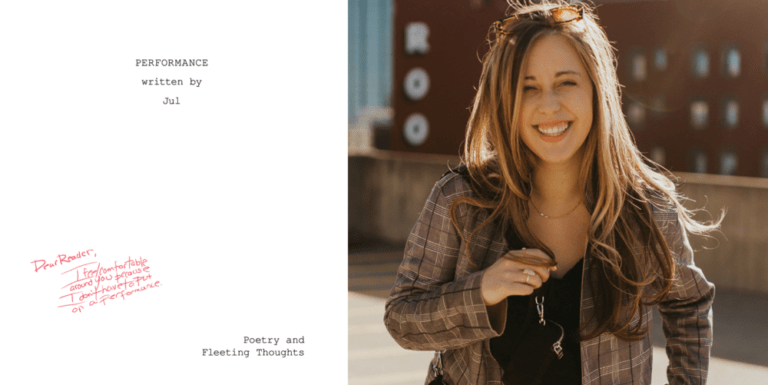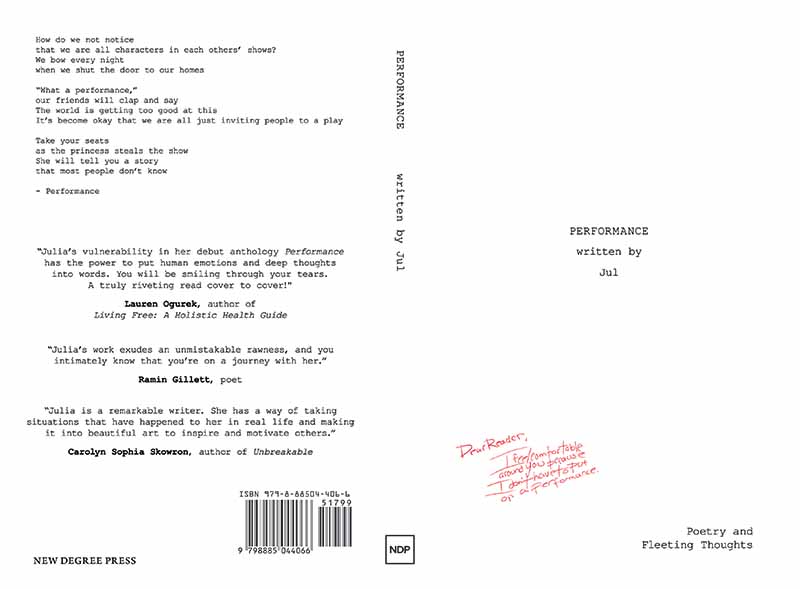“If alarms didn’t exist, I’m afraid I would never wake up.”
From the Publisher: The bestselling Performance: Poetry and Fleeting Thoughts captures moments of despair, insecurity, and wisdom through poems, songs, and drawings. In her debut collection, Jul pulls back the curtain and invites the reader on her path of growth, sharing intimate experiences of grief, jealousy, anger, and heartbreak. Inside these pages, readers will delve into how we all put on a performance when we feel like we can’t act as our most authentic selves, highlighting the reality of healing, empowerment, and acceptance. Performance takes readers through a journey of raw emotions and growing pains that many of us face, and illustrates how, although vulnerability is difficult, it is ultimately the key to getting back up over and over again, and choosing yourself.
More Info About the Author: “Julia Ruggiero, poetry pen name Jul, is a professional speaker, marketer, and the author of the bestselling Performance: Poetry and Fleeting Thoughts, as well as VulnerABLE: How to Notice the Power of Vulnerability Through Lettuce, Laundry, and Love. A graduate from John Carroll University with concentrations in integrated marketing, communications, and leadership development, her passions include learning and speaking about leadership, student entrepreneurship, and mental health awareness, as well as creating content on how humans can better connect and communicate in times of conflict and division. To connect with Julia and check out what she’s been up to, head over to www.juliaruggiero.com.”
We hear that you started your poetry journey by writing song lyrics as early as the age of nine…
I started writing poetry officially a little over two years ago when my dad passed away. But since I was around 9 years old, I would strictly write song lyrics to cope with heavy emotions. I wanted to be a singer, author, and actress when I grew up, but singing was never my strong suit. I went through a period trying to learn GarageBand to produce a song, learned iMovie and later Final Cut Pro X to edit music videos, and continued writing lyrics. But I never took the leap to take voice lessons because the idea of singing in front of people didn’t excite me. It was funny, because in college a friend of mine would write music and I would write lyrics for him. When I would send him voice memos with my idea for the melody, he was a huge advocate for my singing voice. He still has and listens to the first voice memo I sent him of me harmonizing with him. But trying to hit certain notes and coming up with melodies felt difficult and frustrating, where writing came easily and was an outlet for me to express my emotions.
The one thing about writing lyrics that frustrated me was that I always felt the need to have a melody and naturally always tried to rhyme the words. I didn’t really read much poetry growing up, so I didn’t even think to write it. When I was around 20 years old, I received my first official poetry book from my friend, Taylor. It was called, Love Her Wild by Atticus. Her love for poetry inspired me to read more of the genre, and I slowly but surely realized that writing poetry was exactly what I had been looking for my whole life. If I wanted to write a short, fleeting thought, I could. If I wanted to write for pages and pages, I could do that, too. Poetry is so freeing and helps me boil down complex thoughts into one statement or one small story to express how I feel.
You joke that you wrote some of your poetry in the bathroom…
Writing poetry is how I deal with big feelings and how I channel my inner creativity. Sometimes I won’t be able to go to sleep because my mind randomly decides to come up with a genius poetry analogy that I must get up to write down. I can’t really control much of when a poem pops up in my mind. I will try driving an hour to one of my favorite places to relax, take out my notebook, have the whole day planned to write poetry, and not one thing that I write will be salvageable. But when something happens that makes me upset, angry, or even jump for joy, an idea for a poem will typically pop up in my head then and there. I have notebooks and notes on my phone filled with poems and poetry ideas that come up at the most random times. A vast majority of my poems are written AND edited in the bathroom. If someone makes me upset, I will run to the bathroom, write a quick poem or edit/add to a previously written poem that relates to the situation, then come back feeling like my emotions were processed and expressed properly. Poetry helps me organize complicated thoughts that are hard for me to put into words when I feel emotional.
Did you intentionally choose for your first two books to have a theme of vulnerability?
In all my work, I hope to encourage others to feel confident expressing themselves and their feelings, unapologetically. Funny enough, I wanted to avoid writing a nonfiction book filled with advice, but that is exactly what my first book ended up being. After writing my first book VulnerABLE: How to Notice the Power of Vulnerability Through Lettuce, Laundry and Love, I felt confident enough to explore my poetry journey. I started the VulnerABLE Movement after publishing the first book, which is meant to be an effort to help others recognize that we need to change the perception of vulnerability from helpless, powerless, and weak, to helpful, powerful, and influential. Both books that I wrote fall under the movement’s umbrella, and I want all my future work to associate with the VulnerABLE Movement as well. I even find myself more vulnerable in my poetry than in my nonfiction writing. A poem can be as messy as you want, as intellectual as you want, as artistic as you want. Writing a nonfiction book made me feel a ton of pressure to edit my words to perfection, trying to make myself sound as credible as possible. On the other hand, poetry strips my fear away because it is meant to be interpretive, which shows more of my authentic humanity.
Why’d you choose the style of poetry that you did and how does your poetry make your collection unique?
My main goal was to make my poetry easy to understand. I love authors like Rupi Kaur and Makenzie Campbell because anyone and everyone is invited to read their words as they explore heavy topics in a beautifully inclusive way. Most of the feedback that I receive with both of my books is that the reader feels as if they are sitting at a coffee shop with me, engaged in a deep conversation that they can easily understand. These observations of my writing are my favorite because I feel validated that my work is inclusive and simple for the readers to process and interpret.
Any future writing plans you can share with us?
I love writing in all aspects and always have a list of book ideas I hope to write someday, but my priority is to continue focusing on poetry. Writing poetry is the most enjoyable for me at this stage in my life and I am working on new collections that I plan to release in the coming years.
Check out more from Jul (and Julia Ruggiero) at juliaruggiero.com!


























